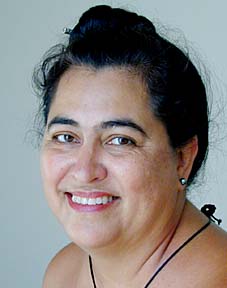

Aloha spirit
awaits world’s
indigenous people
Native Hawaiians and representatives
By Pat Omandam
of 27 countries are gathering in Hilo
for a conference on education
Star-BulletinKeala'aumoe Inciong-Ako believes the best way to turn around the lives of inmates -- most of whom are Hawaiian -- starts with an understanding of fundamental Hawaiian values.
The Women's Community Correctional Center education administrator said that when these native women realize how important they are to the aina, or land, and to the Hawaiian community, they tend to build self-esteem and identity, which pushes them to get out of prison -- and stay out.
"Within the Hawaiian community itself, we know there's a big need to address this because this is our ohana," said Inciong-Ako, who will speak on native women in prison at a workshop next week at the World Indigenous Peoples' Conference on Education in Hilo.

'I think native people
everywhere have an intense
love for the land.'Lilikala Kame'eleihiwa
DIRECTOR OF THE CENTER
FOR HAWAIIAN STUDIES
UNIVERSITY OF HAWAII"These are the people that are falling off the path, traumatized with whatever has happened. I think this is a big link to what has happened before when our people were colonized," she said.
Organizers of the triennial conference began registration yesterday of more than 2,500 native people from 27 countries. The weeklong conference will be held in Hilo beginning Sunday.
Foremost is an elaborate welcoming ceremony at Hilo's Bayfront Beach, where a planned 300 pahu, or Hawaiian drums, and 1,000 chanters and hula dancers will welcome dignitaries arriving Sunday morning aboard the Hawaiian double-hulled canoe Makali'i.
Native educators and cultural experts say the special ceremony is the proper way to welcome indigenous people to Hawaii.
"It's very important for us, in our hospitality, to do appropriate protocol to invite native peoples from around the world to our land," said Lilikala Kame'eleihiwa, director of the Center for Hawaiian Studies at the University of Hawaii.
"Because, it is not just us talking to them, it is our ancestors talking to their ancestors," she said.
Manu Boyd, a Hawaiian cultural expert and publication editor at the Office of Hawaiian Affairs, said there is a growing trend to have the right protocol where native culture is concerned.
"We learn a lot from other indigenous people, and we in turn would like to provide the very, very best example of our culture to these people, who really are our guests," said Boyd, who is also a delegate at the conference.
More than 200 workshops will be held Monday, Wednesday and Friday at UH-Hilo, Hawaii Naniloa Resort, the Hilo Palace Theatre and at a kauhale, or Hawaiian village, set up in town.
On Tuesday and Thursday, the delegates will go off on trips to 46 different cultural and historical sites around the island. And there will be cultural performances throughout the evenings, said Kaimipono Kaiwi, conference media coordinator.
Kaiwi said the workshops will focus not only on Hawaiian issues, but on an array of concerns facing indigenous people in their respective countries.
"This is our time to get together and learn from each other and encourage each other," Kaiwi said Tuesday.
"The goal of the whole conference is to help our students, our children to be successful in education, viewing it from a cultural perspective. We have to be able to function in both the Western world and our own world, and it's been a struggle for some of our kids.
ONE BIG OHANA
What: 1999 World Indigenous Peoples' Conference on Education.
Where: Hilo.
When: Aug. 1-7.
Why: Triennial conference educates people about issues facing indigenous or native populations worldwide.
How: Hosted by the Edith Kanaka'ole Foundation, with help from major sponsors.
Who: The countries represented this year include Australia, Aotearoa, Canada, Taiwan, Fiji, Guam, India, Israel, Japan, Korea, Mexico, Norway, the Philippines, Polynesia-Francaise, Slovenia, Sweden, Tonga, Samoa, Tahiti, Peru, Puerto Rico, Torres Strait, Italy, Finland, Cambodia and the United States.
"So that was the intention of the conference when it was put together about 10 years ago," she said.
In May 1985, indigenous people from around the world gathered in Vancouver, British Columbia, and formed the International Peoples' Education Association. Two years later, the first World Indigenous Peoples' Conference on Education was held in North Vancouver, attended by 1,500 people from 17 countries.
Since then, the triennial conference has been held in New Zealand, Australia and in New Mexico before the Edith Kanaka'ole Foundation agreed to host the 1999 conference in Hilo. Major sponsors include Hawaii Community College, UH-Hilo, Kamehameha Schools/Bishop Estate, OHA, Bank of Hawaii and the Hawaii Community Foundation.
"I think native people everywhere have an intense love for the land, an intense connection for the land as an ancestor, and I believe we'll see that over and over again next week," Kame'eleihiwa said.